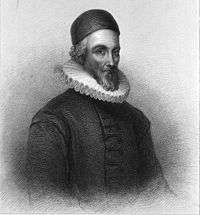Andrew Cant (minister)

Andrew Cant (1590 – 1663) was a Presbyterian minister and leader of the Scottish Covenanters.[1] About 1623 the people of Edinburgh called him to be their minister, but he was rejected by James I.[1] Ten years later he was minister of Pitsligo in Aberdeenshire, a charge which he left in 1638 for that of Newbattle in Midlothian. In July of that year he went with other commissioners to Aberdeen in the vain attempt to induce the university and the presbytery of that city to subscribe the National Covenant, and in the following November sat in the general assembly at Glasgow which abolished episcopacy in Scotland.[1] In 1638 Cant was minister of Pitaligo in Aberdeenshire.[2]
In 1640 he was chaplain to the Scottish army and then settled as minister at Aberdeen.[1] Though a stanch Covenanter, he was a zealous Royalist, preaching before Charles I in Edinburgh, and stoutly advocating the restoration of the monarchy in the time of the Commonwealth.[1] Cant's frequent and bitter attacks on various members of his congregation led in 1661 to complaints laid before the magistrates, in consequence of which he resigned his charge. His son Andrew was principal of Edinburgh University (1675 - 1685).[1]
References
- 1 2 3 4 5 6
 Chisholm, Hugh, ed. (1911). "Cant, Andrew". Encyclopædia Britannica (11th ed.). Cambridge University Press.
Chisholm, Hugh, ed. (1911). "Cant, Andrew". Encyclopædia Britannica (11th ed.). Cambridge University Press. - ↑ "Andrew Cant". Electric Scotland. Retrieved 19 September 2015.
 This article incorporates text from a publication now in the public domain: Chisholm, Hugh, ed. (1911). "Cant, Andrew". Encyclopædia Britannica (11th ed.). Cambridge University Press.
This article incorporates text from a publication now in the public domain: Chisholm, Hugh, ed. (1911). "Cant, Andrew". Encyclopædia Britannica (11th ed.). Cambridge University Press.
| Academic offices | ||
|---|---|---|
| Preceded by Unknown |
Rector of King's College, Aberdeen 1651 - ? |
Succeeded by Unknown |